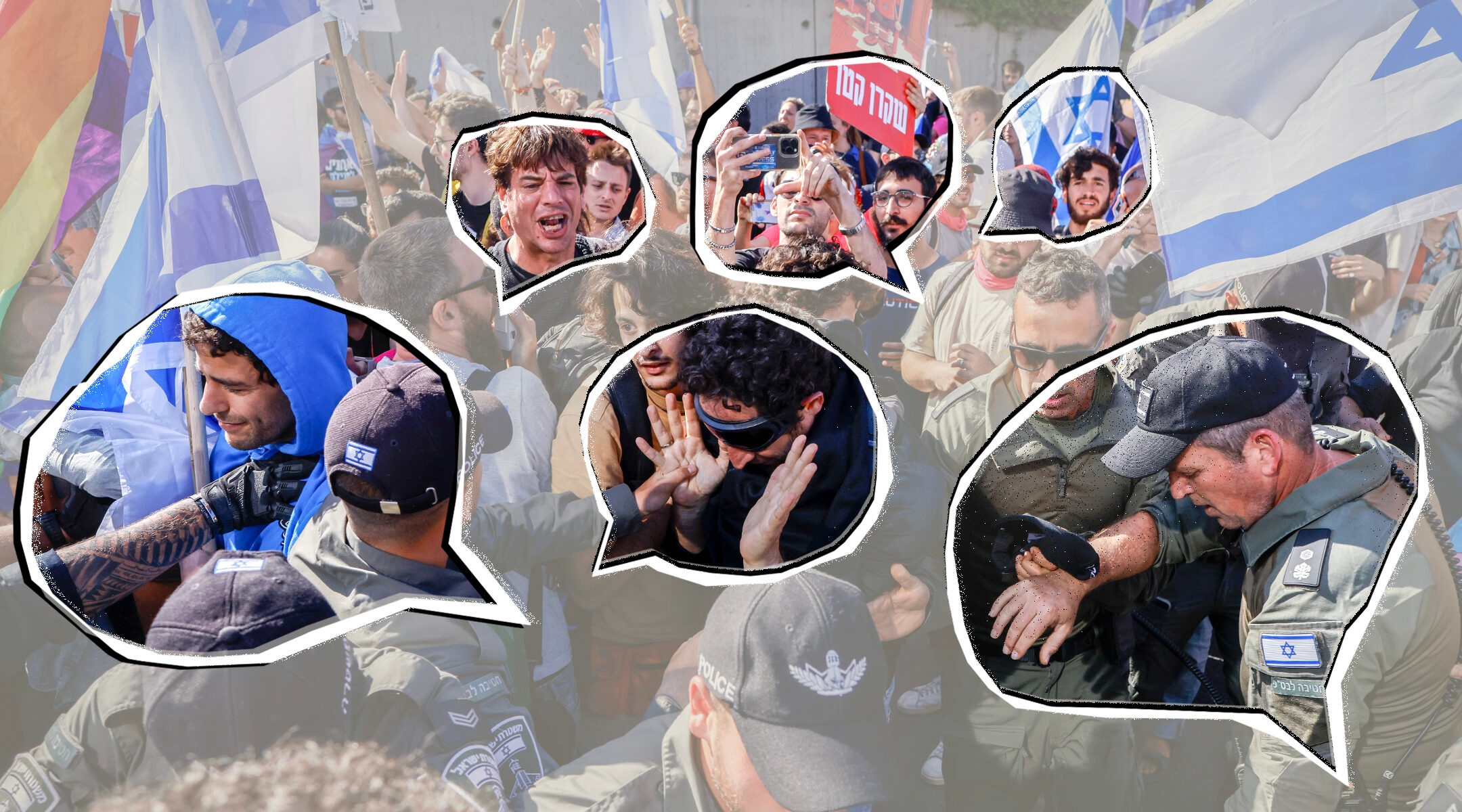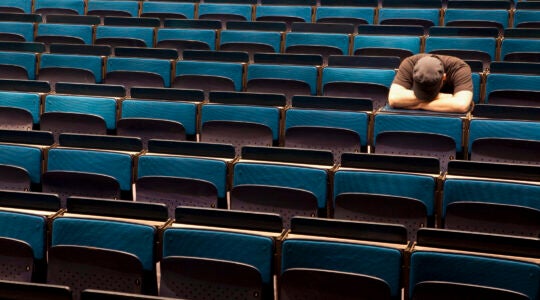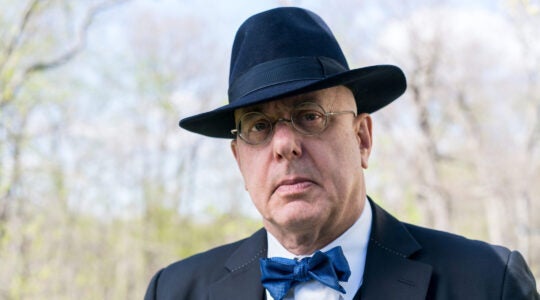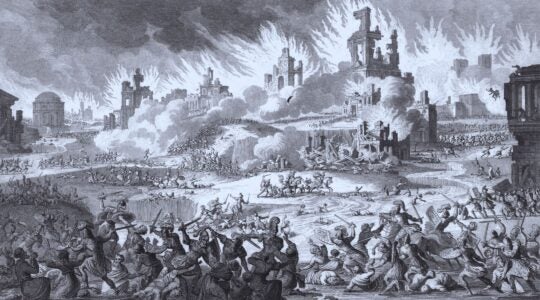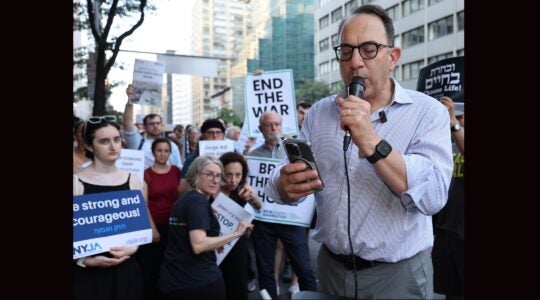(JTA) — When Benjamin Netanyahu put his controversial calls for judicial reform on pause two weeks ago, many thought the protesters in Israel and abroad might declare victory and take a break. And yet a week ago Saturday some 200,000 people demonstrated in Tel Aviv, and pro-democracy protests continued among Diaspora Jews and Israeli expats, including those who gather each Sunday in New York’s Washington Square Park.
On its face, the weeks of protest have been about proposed legislation that critics said would sap power from the Israeli Supreme Court and give legislators — in this case, led by Netanyahu’s recently elected far-right coalition — unchecked and unprecedented power. Protesters said that, in the absence of an Israeli constitution establishing basic rights and norms, they were fighting for democracy. The government too says the changes are about democracy, claiming under the current system unelected judges too often overrule elected lawmakers and the will of Israel’s diverse electorate.
But the political dynamics in Israel are complex, and the proposals and the backlash are also about deeper cracks in Israeli society. Yehuda Kurtzer, president of the Shalom Hartman Institute of North America, recently said in a podcast that the crisis in Israel represents “six linked but separate stories unfolding at the same time.” Beyond the judicial reform itself, these stories include the Palestinians and the occupation, a resurgent patriotism among the center and the left, chaos within Netanyahu’s camp, a Diaspora emboldened to weigh in on the future of Zionism and the rejection on the part of the public of a reform that failed the “reasonableness test.”
“If these protests are effective in the long run, it will be, I think, because they will have succeeded at reorganizing and mobilizing the Israeli electorate to think and behave differently than before,” said Kurtzer.
I recently asked observers, here and in Israel, what they feel is really mobilizing the electorate, and what kind of Israel will emerge as a result of the showdown. The respondents included organizers of the protests, supporters of their aims and those skeptical of the protesters’ motivations. They discussed a slew of issues just below the surface of the protest, including the simmering Israeli-Palestinian conflict, divisions over the increasing strength of Israel’s haredi Orthodox sector, and a lingering divide between Ashkenazi Jews with roots in Europe and Mizrahi Jews whose ancestry is Middle Eastern and North African.
Conservatives, meanwhile, insist that Israeli “elites” — the highly educated, the tech sector, the military leadership, for starters — don’t respect the will of the majority who brought Netanyahu and his coalition partners to power.
Here are the emerging themes of weeks of protest:
Defending democracy
Whatever their long-term concerns about Israel’s future, the protests are being held under the banner of “democracy.”
For Alon-Lee Green, one of the organizers of the protests, the issues are equality and fairness. “People in Israel,” said Green, national co-director of Standing Together, a grassroots movement in Israel, “hundreds of thousands of them, are going out to the streets for months now not only because of the judicial reform, but also — and mainly — because of the fundamental question of what is the society we want to live in: Will we keep living in a society that is unequal, unfair and that is moving away from our basic needs and desires, or will it be an equal society for everyone who lives in our land?”
Shany Granot-Lubaton, who has been organizing pro-democracy rallies among Israelis living in New York City, says Netanyahu, National Security Minister Itamar Ben-Gvir and the coalition’s haredi Orthodox parties “are waging a war against democracy and the freedoms of citizens.”
“They seek to exert control over the Knesset and the judicial system, appoint judges in their favor and legalize corruption,” she said. “If this legal coup is allowed to proceed, minorities will be in serious danger, and democracy itself will be threatened.”
Two researchers at the Institute for Liberty and Responsibility at Herzliya’s Reichman University, psychology student Benjamin Amram and research associate Keren L.G. Snider, said Netanyahu’s proposed judicial reform “undermines the integrity of Israel’s democracy by consolidating power.”
“How can citizens trust a government that ultimately has no limitations set upon them?” they asked in a joint email. “At a time when political trust and political representation are at the lowest points, this legislation can only create instability and call into question the intentions of the current ruling party. When one coalition holds all the power, laws and policies can be swiftly overturned, causing instability and volatility.”
A struggle between two Israels
Other commentators said the protests revealed fractures within Israeli society that long predated the conflict over judicial reform. “The split is between those that believe Israel should be a more religious country, with less democracy, and see democracy as only a system of elections and not a set of values, and those who want Israel to remain a Jewish and democratic state,” Tzipi Livni, who served in the cabinets of right-wing prime ministers Ariel Sharon and Ehud Olmert before tacking to the center in recent years, recently told Haaretz.
Author and translator David Hazony called this “a struggle between two Israels” — one that sees Israel’s founding vision as a European-style, rights-based democracy, and the other that sees that vision as the return of the Jews to their ancient homeland.
“Those on the first side believe that the judiciary has always been Israel’s protector of rights and therefore of democracy, against the rapaciousness and lawlessness of politicians in general and especially those on the right. Therefore an assault on its supremacy is an assault on democracy itself. They accuse the other side of being barbaric, antidemocratic and violent,” said Hazony, editor of the forthcoming anthology “Jewish Priorities.”
As for the other side, he said, they see an activist judiciary as an attempt by Ashkenazi elites to force their minority view on the majority. Supporters of the government think it is entirely unreasonable “for judges to think they can choose their successors, strike down constitutional legislation and rule according to ‘that which is reasonable in the eyes of the enlightened community in Israel,’” said Hazony, quoting Aharon Barak, the former president of the Supreme Court of Israel and bane of Israel’s right.
(Naveh Dromi, a right-wing columnist for Yediot Achronot, puts this more bluntly: “The problem,” she writes, “lies in the fact that the left has no faith in its chance to win an election, so it relies on the high court to represent it.”)
Daniel Tauber, an attorney and Likud Central Committee member, agrees that those who voted for Netanyahu and his coalition have their own concerns about a democracy — one dominated by “elites,” which in the Israeli context means old-guard Ashkenazi Jews, powerful labor unions and highly educated secular Jews. “The more this process is subject to veto by non-democratic institutions, whether it be the Court chosen as it is, elite military units, the Histadrut [labor union], or others, the more people will lose faith in democracy,” said Tauber.
Green also said there is “a war waging now between two elites in Israel” — the “old and more established liberal elite, who consist of the financial, high-tech army and industry people,” and the “new emerging elite of the settlers and the political far-right parties.”
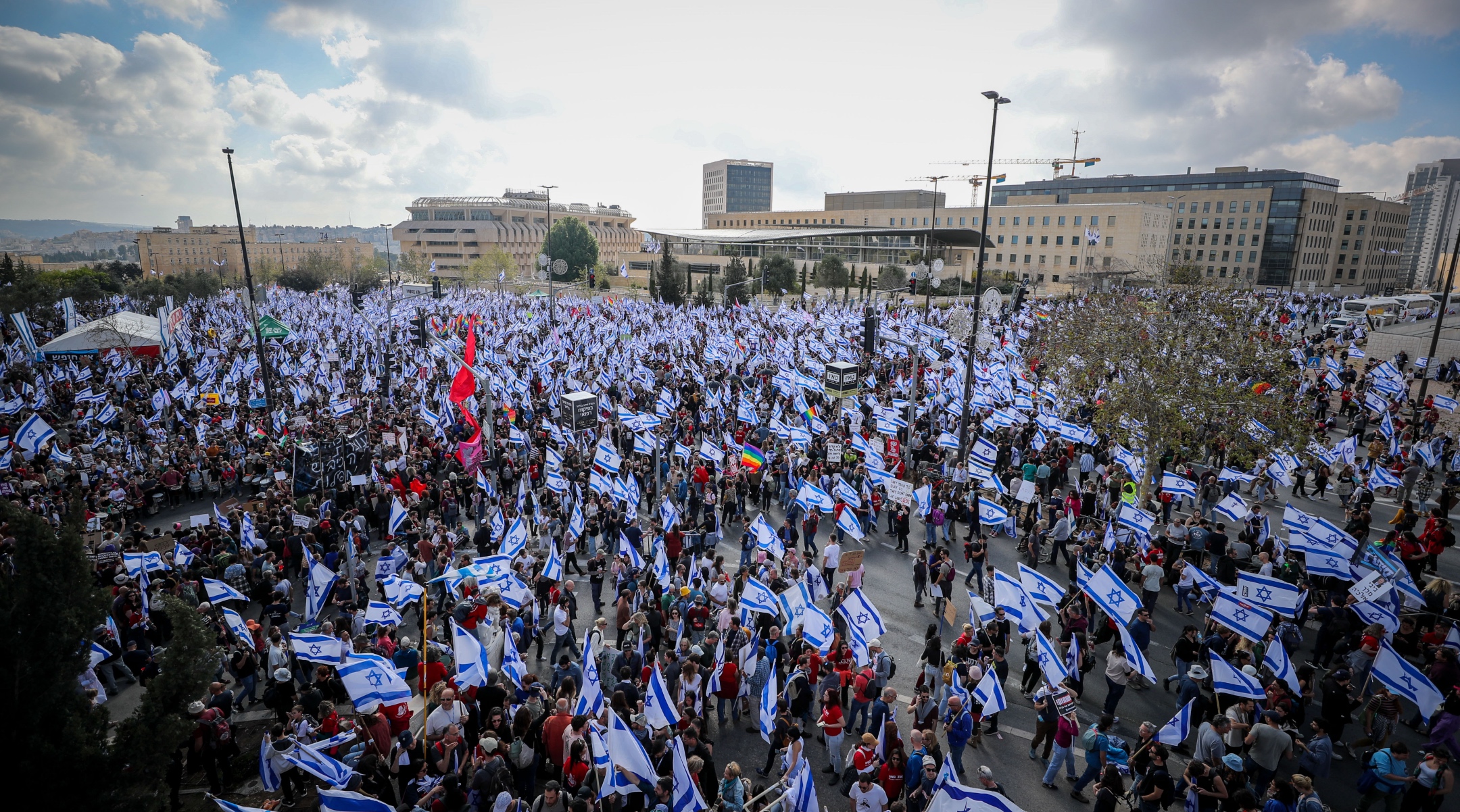
Israelis protest against the government’s planned judicial overhaul, outside the Supreme Court in Jerusalem, March 27, 2023. (Jamal Awad/Flash90)
And yet, he said, “I think we will lose if one of these elites wins. The real victory of this historic political moment in Israel will be if we achieve true equality, both to the people who are not represented by the Jewish supremacists, such as the Palestinian citizens of Israel, and to the people who are not represented by the ‘old Israel,’ such as the haredi and Mizrahi people on the peripheries.”
The crises behind the crisis
Although the protests were ignited by Netanyahu’s calls for judicial reform, they also represented pushback against the most right-wing government in Israeli history — which means at some level the protests were also about the Israeli-Palestinian conflict and the role of religion in Israeli society. “The unspoken motivation driving the architects and supporters of the [judicial] ‘reform,’ as well as the protest leaders, is umbilically connected to the occupation,” writes Carolina Landsmann, a Haaretz columnist. If Netanyahu has his way, she writes, “There will be no more two-state solution, and there will be no territorial compromises. The new diplomatic horizon will be a single state, with the Palestinians as subjects deprived of citizenship.”
Nimrod Novik, the Israel Fellow at the Israel Policy Forum, said that “once awakened, the simmering resentment of those liberal Israelis about other issues was brought to the surface.” The Palestinian issue, for example, is at an “explosive moment,” said Novik: The Palestinian Authority is weakened and ineffective, Palestinian youth lack hope for a better future, and Israeli settlers feel emboldened by supporters in the ruling coalition. “The Israeli security establishment took this all into account when warning the government to change course before it is too late,” said Novik.
Kurtzer too noted that the Palestinians “also stand to be extremely victimized following the passage of judicial reform, both in Israel and in the West Bank.” And yet, he said, most Israelis aren’t ready to upend the current status quo between Israelis and Palestinians. “It can also be true that the Israeli public can only build the kind of coalition that it’s building right now because it is patently not a referendum on the issue of Palestinian rights,” he said.
Religion and state
Novik spoke about another barely subterranean theme of the protests: the growing power of the haredi, or ultra-Orthodox, parties. Secular Israelis especially resent that the haredim disproportionately seek exemption from military service and that non-haredi Israelis contribute some 90% of all taxes collected. One fear of those opposing the judicial reform legislation is that the religious parties will “forever secure state funding to the haredi Orthodox school system while exempting it from teaching the subjects required for ever joining the workforce. It is to secure for them an exemption from any military or other national service. And it is to expand the imposition of their lifestyle on non-Orthodox Israelis.”
What’s next
Predictions for the future range from warnings of a civil war (by Israel’s president, Isaac Herzog, among others) to an eventual compromise on Netanyahu’s part to the emergence of a new center electorate that will reject extremists on both ends of the political spectrum.
David E. Bernstein, a law professor at the George Mason University School of Law who writes frequently about Israel, imagines a future without extremists. “One can definitely easily imagine the business, academic and legal elite using their newfound political voice to insist that future governments not align with extremists, that haredi authority over national life be limited, and, perhaps most important, that Israel create a formal constitution that protects certain basic rights,” he said. “Perhaps there will also be demand to counter such long-festering problems as corruption, disproportionate influence over export markets by a few influential families, burgeoning lawlessness in the Arab sector and a massive shortage of affordable housing.”
Yohanan Plesner, president of the Israel Democracy Institute, also sees an opportunity in the crisis.
In the aftermath of the disastrous 1973 Yom Kippur war, he said, Israel “rebuilt its military and eventually laid the foundations for today’s ‘startup nation.’ In this current crisis, we do not need a call-up of our reserves forces, or a massive airlift of American weaponry to prevail. What we need is goodwill among fellow Israelis and a commitment to work together to strengthen our society and reach an agreed-upon constitutional framework. If we are able to achieve such an agreement, it will protect our rights, better define the relationships between the branches of government, and result in an Israel that is more stable and prosperous than ever as we celebrate 75 years of independence.”
JTA has documented Jewish history in real-time for over a century. Keep our journalism strong by joining us in supporting independent, award-winning reporting.

